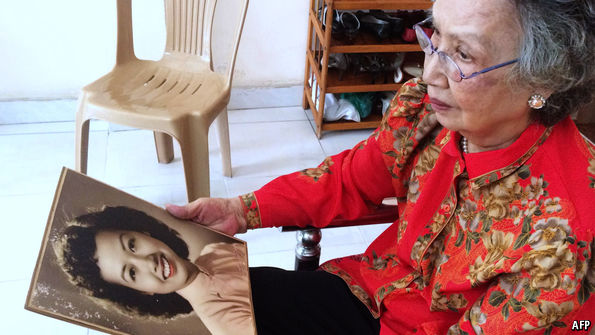
THE voice was faint, for the signal was weak between Hanoi and the Central Highlands. Nonetheless, at 8pm Saigon time, after a day spent avoiding mantraps and pursuing the ever-elusive Vietcong, GIs would try to unwind by listening to the young woman they called “Hanoi Hannah”. As they cleaned their rifles, smoked herbs and broke out a beer or two, their precious radios, strapped up for protection with ragged black tape, crackled with tones that might have been those of a perky high-school cheerleader. “GI Joe, how are you today?” asked the sweet-sounding girl, of men to whom any girl would have sounded sweet. “Are you confused? Nothing is more confused than to be ordered into a war to die or be maimed for life without the faintest idea of what’s going on. You know your government has abandoned you. They have ordered you to die. Don’t trust them. They lied to you.”
Some soldiers would scoff or talk loudly for the time the programme lasted. Others would throw empty cans towards the voice. They listened, though, to the songs she played, sent over by Stateside sympathisers: Joan Baez, Bob Dylan, Elvis Presley and her own favourite, Pete Seeger’s deeply melancholy “Where Have All the Flowers Gone?” Upbeat numbers, such as Petula Clark’s “Downtown”, would have even dog-tired men frenziedly dancing. But then Hannah would switch the mood again, reading out (courtesy of Stars and Stripes,the soldiers’ own newspaper) the names of recent American casualties and their home towns. “Defect, GI,” she would urge each man. “It is a very good idea to leave a sinking ship. You know you cannot win this war.”
The range of her knowledge was disturbing. She announced exactly where units were and, though troops cheered when she mentioned them, they were chilled to be tracked down. She knew the names of all the crew on ships that had just arrived, and once wished a wistful happy birthday to a soldier who had just been killed. Many listened because her information, written by the North Vietnamese defence ministry, was sometimes more accurate than what could be gleaned from sanitised US Armed Forces Radio: revealing in 1967, for example, that rioting was going on in Detroit. Some believed she even knew whether their girls were cheating on them back home, and with whom.
Schooled by the stars
Of course, she was not omnipotent at all: just a petite, smiling, lively young woman who translated, and then read faithfully in faultless American-English, the scripts she was given. Voice of Vietnam had started, in 1945, with Ho Chi Minh’s declaration of the independence of his country; but when she joined ten years later, at 25, she was reading English-language news bulletins rather than full-fledged propaganda. With the mass arrival of American troops in 1965 her broadcasts, previously 5-6 minutes once a day, were extended to 30 minutes three times a day. And it was she who had the exaltation of announcing to the world, on April 30th 1975, that Saigon was at last liberated and Vietnam unified.
She spoke out for the cause, but also because she adored the English language: the language, that is, as mediated by Hollywood and spoken by stars. Her education, in a prosperous family under French colonial rule, had been in French schools, but she was lured very early by the cinema and, there, the fascinating “music” of English. She reckoned she went five times to “Gone with the Wind”, fortified with bread and sausages for the length of the film, listening intently to the raptures of Vivien Leigh and whatever Clark Gable drawled from under his pencil moustache. Private English lessons soon followed, and English at university. As well as perming her hair and applying bright lipstick to look at least a little like a starlet, she practised and practised her English intonation. In her early days at Voice of Vietnam she had Australians for mentors; but it was America that echoed in the way she spoke.
This being so, her broadcasts were not aggressive. Ideology played little part in them; she never joined the Communist Party, feeling patriotic enough. Her delivery was pitched to be persuasive, neither intimate nor tough: striving to demoralise each man a little, advising him to go AWOL or frag his officers, yet evincing concern for him. Only the bombing of Hanoi in December 1972, which forced them to abandon the studio, made her angry. The programmes were explicitly dedicated “to the American people”, or “our American friends”, meaning all Americans who opposed the war. Early on, that meant agitators like Jane Fonda, who sent her good tapes and then, mystifyingly to her, seemed to abandon the cause. Later, increasingly, she felt she had the tactit support of most citizens of the United States.
Ex-soldiers who visited her in later years, when she had given up her broadcasting in Hanoi for domestic calm in hotter, noisier Saigon, found a woman of impeccable manners in exquisite silk blouses and strings of pearls. She dreamed of following her painter son to America, of seeing New York and the Golden Gate Bridge. She had no animus against Americans. Her English, however, was getting rusty, and needed the lubricant of speaking it. So she was happy to say, laughing, “Let bygones be bygones,” as often as she was asked.